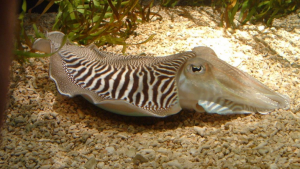ManagementSpeak: In terms of your last question, I’ll have to get you some clarification on that.
Translation: Not a chance.
Thanks to Myron Ware for clarifying “clarification.”
ManagementSpeak: In terms of your last question, I’ll have to get you some clarification on that.
Translation: Not a chance.
Thanks to Myron Ware for clarifying “clarification.”
Consider the cuttlefish.
Cuttlefish engage in what might be called tactical deception. When a male cuttlefish courts a female in the presence of other males, he displays a male pattern facing the female (courtship), and a female pattern facing away, to deceive the other males.

And like their cephalopod relatives the squid and octopus, cuttlefish squirt a black ink into the water when they’re caught by something threatening, obscuring everything around them as they make their escape.
When Cuttlefish managers display different personalities or express different positions and opinions to different colleagues, it isn’t to improve their mating success (okay, it might be, but let’s keep this on a professional level, shall we?). They do this to build political alliances, saying what they think they need to say to whoever they need to say it to in order to persuade everyone around them that I’m on your side.
Because Cuttlefish managers say what they think a colleague wants to hear, with little regard for consistency from one conversation to the next, they’re rarely able to remember what they said to a given individual about a given subject, once they’ve spoken to two or three others about it afterward.
And when someone inevitably calls them on an inconsistency, Cuttlefish managers squirt out their version of black ink … an acoustically opaque collection of sound waves that closely resemble speech, replete with grammar and syntax but utterly devoid of meaning while they make their escape to another meeting.
Some Cuttlefish come by their … plastic? approach to position-taking from a misplaced desire to be cleverly Machiavellian, although Machiavelli would have sneered at their ineptitude.
But in most cases, Cuttlefish-ism seems to be more a consequence of the creature’s invertebrate nature: Lacking a spine, Cuttlefish just don’t have it in them to say anything to anyone that they think might result in rejection or disapproval.
If you don’t know someone is Cuttlefishing you’re in danger of basing your own actions on the belief that you have their support on some issue that matters. When it turns out you don’t, you’ll be the one left holding the bag.
Which is why your tactics for dealing with Cuttlefish start with detection. Fortunately, Cuttlefish, as noted before, aren’t particularly subtle about their deceptions. Talk to them about a subject a few times and you’re likely to get a clue or three; talk to colleagues you respect but with whom you disagree, mention what the suspected Cuttlefish told you, and ask if they’ve discussed the matter with him (or, her).
If the suspect agreed with all of you, he/she is no longer a suspect. He/she is a confirmed Cuttlefish.
Dealing with Cuttlefish isn’t all that hard either, so long as you keep your wits about you. Among your alternatives:
If you’re a SCUBA diver, seeing a cuttlefish in its native habitat is something special. But if, instead, you swim around the cube farms and offices of a modern corporation, spotting a Cuttlefish manager is an experience that’s neither special nor rewarding.
It is, however, better than being taken in by this mollusk’s camouflage.